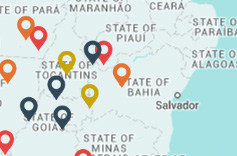Curumim Group Gestation and Labor
Valuing traditional midwives: a campaign to rescue the history of traditional communities and to access women's and children's health
Pernambuco
Objetivos e público prioritário
The project, supported by Brazil Fund, aims to promote through a communication campaign the valuing of traditional midwives, quilombolas and indigenous people, highlighting their contribution in promoting women’s and children’s health and preserving and valuing practices of socially excluded groups. The envisaged actions complement an ongoing project, developed by the group in partnership with the Ministry of Health, which consists of training traditional midwives in seven states.
Context
Midwives in Brazil play an important role in promoting women’s and children’s health, particularly in rural, indigenous and quilombola communities, to whom, in general, basic public services are scarce. However, despite devoting a lifetime to the midwifery, they have no labor or social rights guaranteed.
The decision to promote the inclusion and integration of the work performed by traditional midwives under the Unified Public Health System (SUS) is supported by a number of important legal and political frameworks from different government spheres. They state the need for the definition of guidelines and the implementation of actions towards the respect and appreciation of traditional knowledge and practices in the SUS.
Among them are: the Organic Law of Health, National Policy on Full Health Care of Women, the II National Plan of Policies for Women (PNPM), the National Pact for the Reduction of Maternal and Neonatal Mortality, the National Policy for the Sustainable Development of Traditional Peoples and Communities and the 3rd National Program for Human Rights (PNDH 3). However, these policies that ensure the recognition and valuing of midwives’ traditional knowledge still lack implementation.
About the organization
The feminist NGO has been working since 1989 to defend women’s rights, especially to a life without violence with respect for their sexual and reproductive rights. It also combats racism among young and adult women, traditional midwives and health professionals.
For 10 years it has been working with the Ministry of Health in the training of indigenous and quilombola (1) midwives in Brazil and health professionals for the humanization of labor and birth. In all, more than 3,000 midwives have been trained throughout the country.
(1) N.T.: Quilombola is a person who lives in a quilombo. Quilombo is a century-old community set up by former slaves in Brazil. ‘The contemporary concept of the remaining communities of quilombos encompasses the prevalence of an autonomous process of production within the communities, based on specific territorialities socially established as a result of acts of resistance.’ (ALMEIDA, Alfredo Wagner. ‘Os quilombolas e a Base de Lançamentos de Foguetes de Alcântara’. Ministry of Environment, Brasília, 2006.)
Partnerships
The group is liaised with the Brazilian Association of Non Governmental Organizations - Abong, the National Feminist Network for Health, Sexual Rights and Reproductive Rights, the National Network for the Humanization of Birth and Labor, the Brazilian Women Group, the Brazilian Young Feminist Group, the Brazilian Reflect-Action Network, the Latin American and Caribbean Women's Health Network and the Mercosur Women's Forum.
Funding Line
Annual Call for Proposals
Year
-
Total Granted
R$ 24,596.00
Duration
6 months
Main Themes
Women’s Rights






